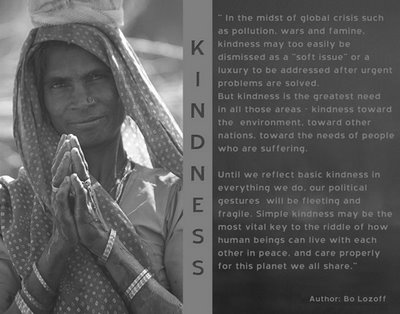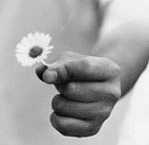David Wilcox and Nancy Petit's, "Out Beyond Ideas," gives musical form to the poet Rumi's profound invitation that we meet him in the field where healing and understanding take root and bear fruit.
This morning my loved friend Ginny Nilsen shared this passage from an essay "Through My Enemy's Eyes" [A Journal of Positive Futures - Winter 2002.] It touches so beautifully on this "place" that is so critical to spiritual healing:
"Inmate proposes alternative to dualistic thinking:
Prison inmate and former prison-rights activist Troy Chapman, sentenced at the age of 21 to life in prison, discusses what he calls "the third side":
"I had spent most of my life splitting the world up into two sides, then fighting to defend one against the other. It was a game in which there were strategies, a clear objective, a field of play, and an opponent.
The poet Rumi pointed to something beyond this game when he said,
'Out beyond ideas of wrong-doing and right-doing there is a field. I'll meet you there.'
"When I began to see myself in other -— even in my enemies -— I found myself heading for Rumi's field. Here the game is not a game. No one wins unless and until everyone wins. The line between victim and perpetrator no longer runs between 'I' and 'Other.' It now runs right through the center of my soul. I am both, as we are all both.
"What then is left to fight for? Where does an out-of-work activist go? Well, God is hiring and God is on the third side. Not the prisoner's side or the jailer's side. Not the Left or the Right.
"The third side is that little-represented side of healing. It's the side that cares as much about the enemy as the friend, that says love is the only justice, the only victory there is. It does not want anyone destroyed. It does not want to win if someone else must lose. It wants something much larger than winning and losing."
"Through my enemy's eyes"
Yes! A Journal of Positive Futures
Winter 2002”
Isn't this the "side" that Jesus advocated for. The place from which he wrote in the dust and urged self-righteous indignation to sit in the quiet field of self-examination and compassion.
Isn't this the only place from which he could have said [as reported in Luke's gospel]:
"love your enemies and do good,
and lend, hoping for nothing again.
for He is kind unto the unthankful,
and to the evil.
Be ye therefore merciful;
Judge not,
and ye shall not be judged;
Condemn not,
and ye shall not be condemned;
Forgive,
and ye shall be forgiven..."
To gather in this field of the third side, is to listen with the heart -- and to do so, without the filter of self-certainty and pre-judgment. It is to take off one's shoes and walk on holy ground.
My sister, Nancy Mullane, wrote a book titled, "Life After Murder: Five Men in Search of Redemption." In it she shares the journeys of five men who'd been found guilty of murder and sentenced to life in prison with the possibility of parole. She tells their stories with a journalist's clear, unbiased voice.
I remember reading one man's chilling account of the crime that had led to his incarceration. Earlier, I had met this man at Nancy's book launch event -- after he had been released on parole. He was humble, thoughtful, and gracious. Reading his story, I felt myself take off my shoes and step into that field. I was beyond my own long-held preconceived notions of what kind of man would commit murder. I was willing to hear his story through the lens of his heart -- without bias or fear.
I also remember, so clearly, the tears I shed for that young man, who'd barely been an adult, when a robbery went horribly wrong. And the sudden realization that:
"There, but for the grace of God, go I...”
How many times had I lost my temper as a teenager fighting with my sister over a shared skirt or a missing shoe. How often had I lashed out, said something unkind, pinched, or even thrown a hair brush. In those moments I was "out of control" -- willing to act on hair-trigger emotions. But I'd also had the privilege of access to books, counselors, and an extended family of spiritual resources for diffusing frustration and feelings of helplessness.
In this field beyond the ideas right and wrong-doing -- and who is on which side -- I felt a new sense of what it meant to have "an understanding heart." This understanding wasn't about figuring out the meaning of a spiritual text. It was about standing next to someone and looking at things from their point of view for the purpose of understanding where they were coming from -- without judgment or opinion. It was the feeling of their hand in yours and the pulse of your common humanity. It was sharing the space of the third side.
I think Troy Chapman says it so well in the above essay:
"The third side is that little-represented side of healing.
It's the side that cares as much about the enemy
as the friend, that says love is the only justice,
the only victory there is.
It does not want anyone destroyed. It does not want to win
if someone else must lose. It wants something much larger
than winning and losing...”
It wants healing -- for one, and for all. It is the place where, as Mary Baker Eddy writes in Science and Health with Key to the Scriptures:
"Love is impartial and universal
in its adaptation and bestowals.”
I will meet you there.
offered with Love,
Kate
After reading this post, Ginny sent me a clip from Harry and Meghan's Royal Wedding with this performance of The Kingdom Choir singing "Stand By Me," let's stand by one another within the space of the third side.







